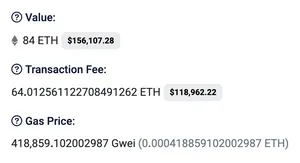WallStreetBets is a subreddit that became popular during the pandemic-fueled everyone-should-become-a-daytrader era, and is known for its memestocks and its users who often make enormously risky gambles on the stock market. The only surprise to me in this particular incident is that it took this long for them to rally around a crypto token, because it's a match made in heaven.The WSB coin launched as an "official memecoin of r/wallstreetbets". The whitepaper explains the token allocation, saying that "It's the fairest launch memecoin you will find with no team allocation and no presale. Just a free airdrop and some coins for the community. 10% of the $WSB supply is reserved as a treasury for the r/wallstreetbets sub to do with as they please. I’m sure they will spend it wisely and definitely not waste it gambling or convincing each other to drink their own urine." Compelling!
The token launched, and quickly achieved a $50 million "market cap". However, on May 3 the token suddenly lost 90% of its value as one of the token creators, "zjz", dumped a massive quantity of the tokens allocated to the team, trading them for 334 ETH (~$635,000).
zjz has claimed that he only sold the tokens because another creator — "WSBMod" — was secretly draining the token by creating huge airdrops and then claiming them for himself. WSBMod, on the other hand, claims that zjz's actions were theft, and has threatened to involve the police and FBI.
Crypto sleuth zachxbt has since gotten involved in the fray, and along with another prominent crypto figure has joined a multi-sig wallet to try to help secure the funds' return without giving any of the creators involved in the dispute unilateral control.








